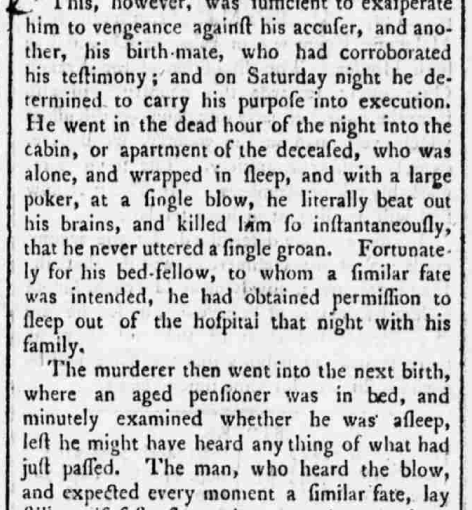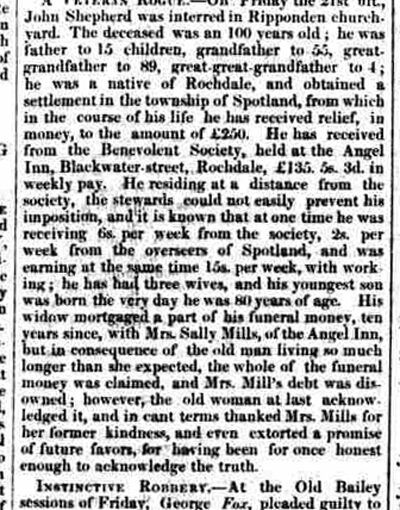Birmingham Daily Post – Tuesday 22 January 1889
WEST BROMWICH.

CHARGES OF THEFT.—Yesterday, at the Police Court, John Rhodes (45), of no fixed abode, was charged with stealing 3lb. of pork of the value of 1s. 6d., the property of Thomas Davis, of Great Bridge Street, West Bromwich. On Saturday night he took the meat from the prosecutor’s window-board. A fine of 21s. 6d., including costs, was imposed, or in default seven days.—Henry Lavender (18), Brook Street, was charged with stealing from a cart a bottle of porter, valued at 3d., the property of the liquidators of John Thomas Duce and Sons, wine and spirit merchants, Union Street, Wednesbury. Prisoner was committed to the assizes for trial.—Alfred Lines (25), of Reynolds Street, Smethwick, was charged with stealing a goose on the 24th of December at West Bromwich, belonging to Charles Williams, of Pleasant Street. Detective Price received information of the robbery, and upon going to the house where prisoner lived found the goose cooking before the fire. The Stipendiary imposed a fine of 25s. 6d., including costs.
Context and Explanation:
- Historical Context:
- This report was published in the Birmingham Daily Post on Tuesday, 22 January 1889. It details minor theft cases handled at the Police Court in West Bromwich.
- The late 19th century saw increased reporting of local crime in newspapers, partly to deter similar offences and partly to entertain readers with relatable, everyday legal dramas.
- Theft Cases:
- John Rhodes (45): Accused of stealing pork worth 1s. 6d. (one shilling and sixpence). His punishment—either a fine of 21s. 6d. or seven days in prison—was typical for petty theft.
- Henry Lavender (18): Charged with stealing a bottle of porter worth 3d. (three pence). His case was deemed serious enough to be sent to the assizes (higher court).
- Alfred Lines (25): Charged with stealing a goose on Christmas Eve. The stolen goose was found being cooked when the detective searched his residence. He was fined 25s. 6d.
- Legal and Social Implications:
- Petty theft was often treated harshly in Victorian courts, with fines or imprisonment handed out even for low-value items. Theft of food, like pork or a goose, suggests economic hardship or desperation.
- The mention of specific fines, courts, and processes illustrates how justice was administered at the local level.
- The Role of Detectives:
- The reference to Detective Price highlights the growing use of detectives in local policing. Detectives were often responsible for investigating crimes and gathering evidence.
Use for Genealogists and Historians:
- Family History:
- If any of the individuals mentioned—John Rhodes, Henry Lavender, or Alfred Lines—are ancestors, these records provide personal details (age, address, alleged crimes) and a snapshot of their lives.
- Local History:
- The article paints a vivid picture of life in late 19th-century West Bromwich, with its legal proceedings, economic struggles, and social challenges.
- Economic Insights:
- Theft of small, low-value items like food or drink reflects the economic conditions of the working class in this era.
- Crime and Punishment:
- Historians studying Victorian legal systems can use this report to understand how petty thefts were handled and the disparity in punishments for seemingly minor crimes.
Free to use British Newspaper Research Service
British newspapers offer a treasure trove of information for family historians. They capture moments in time, providing context, character, and community insight that official records cannot. With the free service provided by Old British News, this research becomes even more accessible, enabling historians to delve into rich, untold stories of their relatives. By combining these resources with other records, family historians can create a more complete and engaging picture of the past.
I search historical articles to locate mentions of your ancestors—whether they were involved in notable events or simply part of the everyday life reported in these newspapers. If relevant articles are found, I deliver them to you in a PDF format at no cost.
If I find articles, they’ll be sent to you in a clear, organised PDF. If not, you’ll be informed right away. See here.




